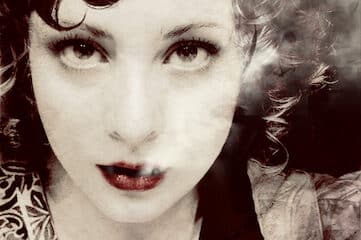Bodies as black as the nights in uninhabited woods, the red hourglass their defining mark. They are known as killers, the original femme fatale. I see a women’s silhouette in the red, their only overt mark of femininity. If you tilt your head it looks like smeared lipstick, some drug store stain, like Lady Danger or Cherry Bomb.
My mother never taught me how to put on makeup. The first time I held a mascara wand I was twelve in her bathroom. She was out of town and I gingerly brushed the mascara on my lashes, tickling like a spider crawl. My mom grew up with a mother who didn’t teach her makeup, either—didn’t teach her safe sex or anything outside of how to steal bread from the grocery store and how to pretend evaporated milk tasted good. I, at least, got to drink real milk, skim, white water in a plastic gallon.
Widows because they mate and kill; who needs a man—not a black widow, and certainly not me. They wind them up in silken webs and, when hungry, liquefy their victims and drink their fluids. The remainders of the corpses hang and fall from the web, crushed underneath the feet of an unknowing passerby.
My first black widow was a spiderling, just like me. My mother had left and I was wandering alone, in desperate need of someone who loved me. Instead, she poisoned me. She put the first cigarette in my mouth, but I inhaled, and I reveled in the power that the poison gave me. She exhaled smoky tendrils, wrapped them around me. I felt strong, but the strength I felt was iron webs tightening around my lungs. I quit, though, after I coughed up my own blood, the startling red of a widow’s underside. My she-spiderling left soon after, and my heart and lungs ached for her and her toxicity. She was both a widow and a careless passerby; I was crushed without notice.
When I met my last black widow woman, she gleamed, and she made me feel like the same spiderling from years ago, her red hourglass full of the sands of false vows. You don’t need anyone else, she promised, and I believed her. I was new to the nuances of this mating ritual she performed, full of subtle manipulation and an abundance of shallow affection. The apartment seemed to grow smaller every day, so small already, a rickety one bedroom with a combined kitchen and laundry room; we called it a kitaundry, and the oven took two hours to preheat. The walls and her words closed in on me, so thin and so loud that I knew our neighbors could hear. No one ever came to save me.
The web was spun, soft and silky, skin on skin, made of trust and so carefully constructed like gold strands around me, slowly, painstakingly, until I was completely entwined and it was too late to find a way out. It wasn’t tobacco or venomous digestive fluids coursing through my body; it was self-loathing, her poisonous words whispering sweet lies that I waited all day to hear. It wasn’t crushing jaws that finished me; it was the whispers that turned to screams, and, only once, a fist to my right eye.
Black widows are not known to be maternal. They reproduce out of evolutionary instinct, or maybe just a reason to kill. Hundreds of eggs are laid in the web, and once hatched, the spiderlings scurry off into the distance, where, based on their sex, they grow to kill or be killed.
It was an accident; my mother was 16, and her mother was terrified of what people would think. Her growing stomach was hidden under large sweatshirts and she had never been more in love. They moved to Florida, the state of sunshine and neighborly ignorance, where the spiderling could be raised by my mother’s mom. My half-sister was the first of six to be hatched and serially abandoned by my mother in her never-ending search for new mates and prey. I was the second. She came into my room with a hard blue suitcase and told me she’d see me soon, then she left to find the man who made her secret belly feel worth it.
She sends me a Halloween card every year, with a cartoon spider on the front. The inside is empty except for my name and “xoxo, Mom.” They’ve collected in a box I swear one day I’ll burn, the many appendages of the smiling spiders curling up into a ball, and I also swear that I’ll one day write her back.
Black widow women, I think you’ve ruined me. My years living with danger make stability seem wrong, too safe. I sometimes long for smoky poison to sink its fangs into me, for loud words echoing around me in small spaces. I touch my right browbone, the small, still sensitive bone chip the only remainder of my black widow woman. When my mom saw my black eye, she pretended to believe my story, that it was an accident. It was easier that way.
–
Samantha is the managing editor of Fantastic Floridas and Burrow Press Review. Her work has appeared or is forthcoming in The Cypress Dome and Imprint. She lives in Orlando, Florida with her cats and various coffee makers. Follow her on Twitter @sambuos.
Lead image: “Amaya” (via Flickr user Elba Fernández)

